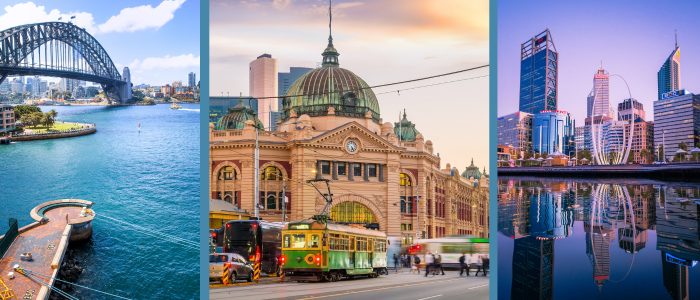Australia has long been a popular destination for Kiwis looking to make a fresh start, offering stunning landscapes, a laid-back lifestyle, and a robust economy. Whether you’re moving from New Zealand for new opportunities, better weather, or simply a change of pace, Australia has something to offer. However, with so many vibrant cities to choose from, deciding where to settle can be a bit overwhelming. Sydney, Melbourne, Brisbane, Perth, and Adelaide are among the most popular destinations, each with its own unique blend of lifestyle, work opportunities, and cost of living. In this article, we’ll break down the key factors to help you make an informed decision on which Australian city is the best fit for your move from New Zealand.
1. Cost of Living: Where Does Your Budget Fit In?
When choosing a city to move to in Australia, the cost of living is crucial. Australia’s cities are often pricey, but costs vary significantly. According to ABC News, rents have surged nationwide, with some cities seeing significant hikes. This is vital for anyone relocating, as housing costs greatly impact living affordability in Australia.
Sydney
As Australia’s largest city, Sydney is also among the most expensive. Housing is costly, especially in the CBD and suburbs like Bondi and Surry Hills. A two-bedroom apartment’s median weekly rent is $700 to $1,000. Sydney offers a high standard of living, excellent public transport, top-tier healthcare, and job opportunities, but it’s costly for newcomers.
Melbourne
Melbourne is slightly cheaper than Sydney, especially in terms of housing. A two-bedroom apartment in the city centre rents for $600 to $850 per week. By 2024, Melbourne’s rental market increased by 9.6%, with median rent around $589 weekly. Known for its arts, food, and culture, Melbourne offers diverse lifestyle options and reliable public transport. It also has excellent healthcare and education, attracting families and young professionals.
Brisbane
Brisbane, Queensland’s capital, is more affordable than Sydney and Melbourne. A two-bedroom apartment in central areas rents for $450 to $650 weekly. The overall cost of living is lower, especially in housing. With a subtropical climate and outdoor lifestyle, Brisbane is ideal for those seeking a relaxed yet urban lifestyle.
Perth
Perth, located on the western coast of Australia, is well-known for its relatively lower cost of living compared to the more expensive eastern cities. While housing costs have risen across the country, Perth remains one of the more affordable major cities in Australia. The median weekly rent has increased to $669, reflecting a 13.6% rise year-on-year. Rent for a two-bedroom apartment in central Perth typically ranges from $500 to $700 per week, although prices can be higher in certain areas.
When comparing Perth’s rental market to cities back home in New Zealand, the difference is striking. According to Scoop.co.nz, the average rental in Perth is $575, which is significantly lower than the $750 to $1,200 range commonly seen in Auckland, NZ. This makes Perth an attractive option for those looking to save on housing costs without sacrificing access to high-quality amenities. The city is also renowned for its beautiful beaches, outdoor lifestyle, and thriving mining industry. However, its more isolated location may be a consideration for some, as it’s farther removed from other major Australian cities.
Adelaide
Adelaide is one of Australia’s most affordable major cities. A two-bedroom apartment in central areas rents for $350 to $550 weekly. With a lower cost of living than Sydney, Melbourne, and Brisbane, it attracts those seeking affordable housing. Known for its relaxed lifestyle and vibrant festivals, Adelaide is a hidden gem for newcomers seeking quality living at a lower cost.
2. Job Opportunities: Where Are the Best Careers?
Whether you’re moving to Australia for work or seeking new career opportunities, each city offers distinct advantages based on the local economy and job market.
Sydney
Sydney remains Australia’s financial and business hub, with a Gross Regional Product (GRP) of $141.73 billion in the year ending June 2023. The city’s job market is strong, with Professional, Scientific, and Technical Services being the largest employer, generating 176,168 local jobs in 2022/23. Financial and Insurance Services are prominent, with a high jobs-to-residents ratio of 9.87. The mining sector also has the highest productivity, generating $434,653 per worker. While competition is fierce, Sydney offers abundant opportunities, particularly in finance, tech, and media, making it ideal for professionals seeking high-paying industries.
Melbourne
Melbourne, with a GRP of $115.73 billion, has a diverse economy focused on creative industries like fashion, media, and arts, as well as thriving healthcare and education sectors. It is a major player in Australia’s economy and boasts a jobs-to-residents ratio of 6.11, indicating more jobs than resident workers. The Professional, Scientific, and Technical Services industry is the largest by business registrations, comprising 22.1% of total businesses in the city. Melbourne’s strong tech and innovation scene, along with its high-income workforce, makes it a prime destination for professionals in these fields.
Brisbane
Brisbane’s economy continues to grow, with a GRP of $153.45 billion in 2023, a 2.7% increase from the previous year. Health Care and Social Assistance is the largest employer in the city, creating 147,520 jobs in 2022/23. The city also has a relatively high productivity rate in industries like Electricity, Gas, Water, and Waste Services, which generates $353,120 per worker. With a jobs-to-residents ratio of 1.30, Brisbane’s job market is favourable for skilled workers, particularly in healthcare, engineering, and construction, while offering an excellent work-life balance.
Perth
Perth’s economy, driven by mining and resources, had a GRP of $50.40 billion in 2023, with a 7.0% growth from the previous year. As the mining industry remains dominant, the city offers significant job prospects in energy, construction, and technical industries. Despite being smaller than other capitals, Perth’s economy remains robust, with substantial growth in sectors like healthcare and tech. The city is appealing to professionals seeking high-paying roles in resource-driven industries.
Adelaide
Adelaide’s economy is becoming increasingly diversified, with notable sectors including defence, manufacturing, IT, and agriculture. The city is also growing as a hub for renewable energy and space technology. While Adelaide’s job market is more competitive compared to larger cities, it is an attractive option for those in specialised industries, especially with a lower cost of living. The expanding sectors in innovation and technology continue to create opportunities for skilled professionals.
3. Weather: How Does the Climate Affect Your Lifestyle?
Australia’s weather varies considerably between cities. Depending on what kind of climate you prefer, the weather can play a huge role in your decision.
Sydney
Sydney enjoys a humid subtropical climate, with warm summers and mild winters. Summer temperatures average around 26-27°C, while winter temperatures hover around 8-13°C. The city is ideal for those who love outdoor activities year-round, especially with its beaches and sunny weather.
Melbourne
Melbourne is known for its unpredictable weather and can experience all four seasons in a single day. Summer temperatures average around 25°C, but it can occasionally reach over 40°C. Winters are cold and can dip to 5°C. For those who enjoy experiencing different seasons and don’t mind a bit of weather variability, Melbourne is an exciting choice.
Brisbane
Brisbane has a subtropical climate with hot, humid summers and mild winters. The average annual temperatures range from a mean minimum of 16.6°C to a mean maximum of 26.6°C, making it Australia’s second-hottest capital city. Temperatures above 26°C are common from October to April, with occasional peaks reaching 35°C. Winter temperatures rarely dip below 20°C, with the coldest month averaging a maximum of 22°C. Brisbane’s mild, sunny weather makes it ideal for outdoor activities year-round.
Perth
Perth has a Mediterranean climate, with hot, dry summers and mild winters. Summer temperatures regularly reach 30-40°C, while winters are mild, averaging 8-18°C. Perth is perfect for those who love long, sunny days and outdoor living.
Adelaide
Adelaide experiences a Mediterranean climate similar to Perth, with hot, dry summers and cooler winters. Summer temperatures can rise to 35°C or higher, while winters are mild, averaging around 15°C. It’s a great city for those who enjoy warm weather but prefer not to deal with the intense humidity of cities like Brisbane.
Finding the Right Fit for You
Choosing the right city to move to in Australia depends on your lifestyle, job opportunities, and budget. Sydney and Melbourne remain top destinations for those seeking a vibrant, cosmopolitan lifestyle, though both cities come with higher living costs. Brisbane and Perth offer a more relaxed and affordable lifestyle, with great weather for outdoor activities. Adelaide, often considered a hidden gem, stands out for its affordability and growing industries, making it a great choice for those looking to settle in a more up-and-coming area.
To help you navigate the moving process, check out these comprehensive city-specific guides:
Each city has its own unique charm and opportunities. By considering factors such as cost of living, lifestyle preferences, and job prospects, you can make an informed decision about where to plant your roots in Australia. Whether you’re after a bustling city vibe or a more relaxed atmosphere, the perfect city for you is out there.
For more information on the moving process, visit our Moving to Australia page or call us at 0800 472 2369 to speak with one of our relocation experts.


